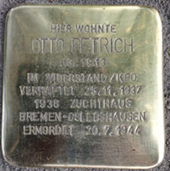Search for Names, Places and Biographies
Already layed Stumbling Stones
Suche

© Privat
Otto Petrich * 1913
Gazertstraße 21a (Harburg, Harburg)
HIER WOHNTE
OTTO PETRICH
JG. 1913
IM WIDERSTAND / KPD
VERHAFTET 25.11.1937
1938 ZUCHTHAUS
BREMEN-OSLEBSHAUSEN
ERMORDET 20.7.1944
Otto Wilhelm Walter Petrich, born on 4 Jan. 1913 in Harburg, detained in "protective custody” ("Schutzhaft”) in the Fuhlsbüttel concentration camp, detention in the Bremen- Oslebshausen penitentiary, murdered on 20 July 1944
Gazertstrasse 21 (Harburg District, Harburg quarter; formerly Sternstrasse 29a)
Otto Petrich, born on 4 Jan. 1913 in Harburg, grew up with his mother. His father, having served as a soldier in the First World War, was considered missing in action after the end of the war. Mother Emma married the worker Albert Karolczack on 1 Apr. 1922. From 1926 onward, the family lived at Marxstrasse 11 (today Reinholdstrasse).
Otto Petrich was 20 years old when he was arrested for the first time: On 20 May 1933, he was imprisoned for a few days for distributing banned printed matter. In the subsequent trial, he received a prison sentence of one year (based on the "Decree for the Protection of the People and State” – VO. zum Schutz von Volk und Staat. Before beginning to serve his sentence, he was drafted from Sept. to Nov. 1933 into the Reich Labor Service (Steel Helmet Camp Section). The subsequent detention lasted from 8 Nov. 1933 to 8 Nov. 1934.
In the ensuing period, Otto Petrich worked for various Harburg companies as an assistant mechanic, in the very end at W. u. E. Nörenheim.
On 25 Nov. 1937, Otto Petrich was taken into "protective custody” for "activity hostile to the state” and detained in the Fuhlsbüttel concentration camp. The criminal charge was "high treason”; a more detailed indictment cannot be found in the file.
On 12 Dec. 1937, the criminal investigation department presented him as a co-defendant in a criminal trial pursuant to Sec. 218. His fiancée and he had allegedly had an abortion. Neither of them denied the charges. His fiancée Frieda testified, "We did not have the means to get married.” Because of the young age of the accused, a sentence of six weeks in prison was imposed on 18 Feb. 1938.
At the end of the trial, the Chief Public Prosecutor at the Regional Court (Landgericht) asked the Gestapo "whether this punishment can be served in interruption of protective custody.” In his letter dated 27 July 1938, the Chief Reich Prosecutor with the People’s Court (Oberreichsanwalt beim Volksgerichtshof) asked for "the execution [of the sentence] to be postponed, as the case against Petrich will be tried in a short order.”
Before this trial took place, Otto Petrich was transferred to the Hamburg pretrial detention center on 16 Mar. 1938 and to Berlin-Moabit on 7 Oct. 1938.
The trial before the People’s Court, 1st Senate, took place on 14 Oct. 1938. Otto Petrich was sentenced "for the preparation of a treasonous enterprise ... including consideration of six weeks imprisonment passed against him by the verdict of the Harburg-Wilhelmsburg Court of Lay Assessors [Schöffengericht] dated 18 Feb. 1938, to a total sentence of eight years and three weeks and eight years’ loss of civic rights.” The six months of the period served in pretrial detention were taken into account.
Otto Petrich was to serve his prison sentence in the Bremen-Oslebshausen penitentiary, where he was transferred on 8 Nov. 1938. Since the beginning of 1933, the prison had been run by SA leader Wegner, who was committed to "deterrence and discipline.” At times, half of the prisoners were political prisoners. The prison was hopelessly overcrowded with up to 1,200 prisoners, and the prisoners received only poor care. Many prisoners were malnourished – especially in the war years.
Otto Petrich also fell ill due to the prison conditions. He was admitted to the "St. Magnus” auxiliary hospital on 6 June 1944 and died there on 20 July 1944. The attested cause of death was "pulmonary tuberculosis.”
Translator: Erwin Fink
Kindly supported by the Hermann Reemtsma Stiftung, Hamburg.
Stand: June 2020
© Margrit und Helmut Rüth
Quellen: StaH 351-11_15823; StaH 741-4 Fotoarchiv, A 259; StaH 213-11_ 06569/38; Adressbuch Harburg 1926; Adressbuch Harburg-Wilhelmsburg 1938-

